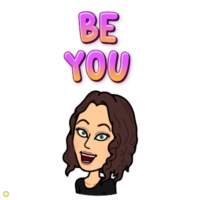
As the month of May is coming to a close, #MentalHealthAwarenessMonth is nearly complete. Throughout the month, I have seen the phrase “It’s ok to not be ok” again and again on social media. Those six words send a powerful message. It is freeing to be your authentic self, to acknowledge where you are at and celebrate who you are becoming. But this can take a great deal of bravery, both within and outside of ourselves. The first step is awareness of one’s self. Authenticity requires knowing oneself. And embracing our journey.
Identify Emotions

Self-awareness is a core competency of SEL (social-emotional learning) according to CASEL. In my own life, I have found great benefit in increasing my own self-awareness – through a spirit of curiosity as I analyze tendencies, trends, and triggers. This naturally leads to another SEL core competency – self-management. As educators, it is extremely beneficial for us to both practice strategies to build our self-awareness, and also to promote this competency with our students. It is important for human beings to identify emotions. Awareness precedes accompanying action of self-management. Many educators of young students ask them to circle an emoji that best describes their mood. In professional learning sessions that I facilitate, I often begin by asking participants to take a few moments to consider where they fit on a mood chart. My supervisor asks our entire team to check in on the daily schedule with an indication of our mood as well as our physical health. I believe these to be valuable methods of fostering self-awareness.

Sincerity Requires Safety
It may seem simple to include a mood chart and reflection within our day and claim we are promoting self-awareness for ourselves and those we serve. But we must beware of bias. We must refrain from judgment. We must create a safe space to embrace our journey, and that of others. I invite people to share their place on the mood chart with others if they so choose, but I do not make it mandatory. I believe it is vital that we honor privacy. Otherwise, we may unintentionally sabotage the process of growth. Self-awareness can be messy. If not presented in the midst of psychological safety, it can turn into feelings of shame, self-loathing, guilt, and isolation. And this can be counter-productive, causing individuals to hide what may be seen as “negative” emotions underneath the surface.
Often, we look toward happiness and/or contentment as an emotional goal. But this mindset is dangerous. If I am in a classroom in which the teacher rejoices that everyone marked the happy emoji on the mood chart for two days in a row, I may not be honest when I am saddened by circumstances in my life. Perhaps I may believe that this honesty would be seen as a disappointment.
Stigma Suffocates Self-Confidence
Stigma can cloud self-awareness as well. As a college student, I approached a professor, asking him to sign a withdrawal form for his class. I had been struggling with mental health challenges and needed to lower my class load. The professor did not want me to drop the class. I indicated I could provide a doctor’s note to support my reasoning. Begrudgingly, the professor signed the form and remarked, “It is all in your head. You have no reason to be stressed or depressed. Mental health is an excuse for laziness.” I was appalled.

Fortunately, I had done a great deal of research regarding the neuroscience affecting mental health. Personally, I understood that mental illness is not a negative reflection on my self-worth. But this is not the case for all individuals. Comments that stem from stigma can greatly impact self-image and confidence. Self-awareness is about identifying emotions, not masking or changing them. Once we progress in self-awareness, we learn how to personalize the way we manage these natural feelings of being a human being.
Though I dropped a few classes the semester I experienced stigma from the aforementioned professor, I still managed to graduate with a 4 year degree in a matter of 3 years…which does not seem to equate to laziness! But the experience greatly affected me. It would be years until I felt safe enough to speak of my mental health. And I continue to struggle to find the courage to fight the stigma even today.
Embrace the Authentic Self
Brene Brown has said, “Vulnerability is not weakness; it’s our greatest measure of courage”. For many, it takes courage to be honest on a mood chart. It takes bravery to admit our struggles. Remember, happiness is not the goal. Embrace the fact that some days are better than others, that motivation may come and go, that each day will not be sunny. And know that this is ok. It is what makes us human. Encourage authenticity from those you serve, but be aware that some may not yet have the courage to be vulnerable. And that is ok too. There are factors beyond your control that may have caused this hesitation. For your part, continue to foster an environment of psychological safety and give yourself and your students grace. Celebrate you, scars and all. And honor the variable journeys of those you serve as well.
